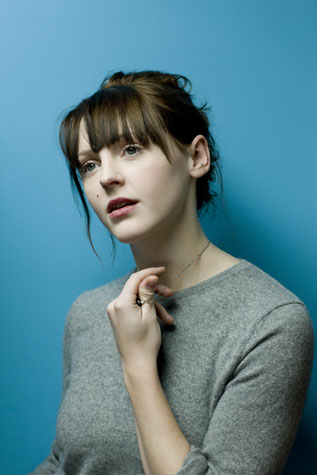
STUNNING RANGE Laura Marling. |
Khaela Maricich, of the Portland, Oregon-based, low-budget electro-pop group the Blow, and Britain’s dauntingly young and talented folk star Laura Marling (20 years old, and already touring her second album) don’t, frankly, deserve to be lumped together like this. But here we are, with both acts playing SPACE Gallery in the next week, armed to the teeth with bracingly intelligent songs about romance and heartache. Let’s get to know them a little better.
THE BLOW
Maricich, bringing a new semi-narrative performance art-show to SPACE on May 5, has been performing as the Blow since 2001 (she used to be a member of the Microphones), both on her own and with various collaborators, most prominently YACHT’s Jonah Bechtolt, with whom she recorded her last album, 2006’s Paper Television (K Records). That record, her best and most conceptual, is both relationship music and dance music; in both realms, its guiding purpose seems to be to cut through the bullshit.
Bechtolt’s beats sound like pre-programmed keyboard settings chopped and tweaked to life as Maricich gives a dissertation on the economics of love. Throughout Paper Television, she quantifies romance: “All the girls are sitting on a pile of gold/The boys, you know they want it, they want it,” she says on opener “Pile of Gold,” before warning “you should treat us good” so “we’ll share more of our goods with you.” The technique, in front of Bechtolt’s twittering and mechanized beats, reads as witty and cold, but Maricich’s appealing speak-sing voice betrays plenty of humanity, and her best songs combine calculations with disarming moments of empathy and candor.
The Blow’s most durable hit, “Parentheses,” offers a memorable turnabout: “If something in the deli aisle makes you cry/Of course I’ll put my arms around you and I’ll walk you outside/Through the sliding doors/Why would I mind?” The verse would be randomly quirky if the scene weren’t so easy to visualize, but what follows reveals a larger truth about what men and women need from love, as Maricich muses “You’re not a baby if you feel the world/All of the babies, they can feel the world/That’s why they cry.” More than companionship, what Maricich’s characters seek is security. While other songs don’t always reach that crucial point, she makes great hay out of detailing her end of the bargain.
LAURA MARLING
Standing trim and in profile with an up-do on a white backdrop, the cover of Laura Marling’s second album, I Speak Because I Can (Astralwerks), can’t help but beg some easy comparisons to another relatively young, fully-formed female songwriter (Leslie Feist, circa The Reminder). But Feist’s poise, ever tinged with vulnerability, seems meek when compared to the stony command Marling delivers on the follow-up to her Mercury Prize-nominated debut, Alas I Cannot Swim (Virgin). She’ll be at SPACE May 11 with the Middle East.
What first grabs you is Marling’s voice: in the stormy climaxes of “Devil’s Spoke” or “Rambling Man,” her range is stunning, as captivating in yodeling high notes as it is in dusky incantations; in quieter moments, it resembles Nick Drake’s in its lilting, conversational rhythm. It’s easy to imagine Drake singing “Made by Maid,” finding resolve in the most matter-of-fact way, saying “But my feet resolute/Found their root and brought me back to this place/And I’m here where I was born/There was a rose without a thorn/I cut it off each year and give it away.”